44 Search Results for teenage
June 24, 2019
by Carole Zangari -
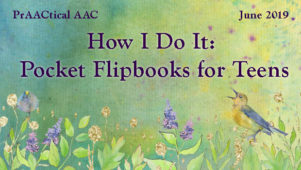
Thanks to all who reached out to express appreciation for Katherine Dally’s series on making and using flipbooks for adults and teenagers with complex communication. Today, she continues that series with a case example of how she used this to support a young woman who communicates through multiple modalities, including an SGD. Katherine is an SLP who works both as an AT consultant for an educational service center and as a home health SLP serving adults with neurological conditions in Ohio. We’re grateful to Katherine for sharing her experiences and for the downloadable materials that are linked at the end of her post If you missed her previous posts in this series, you may want to check those out: How I Do It – Pocket Flipbooks for Adults & Teens: Part 1, Part 2. :::::::::::::::::::::::::::::::::::::::::::::::::::::::::::::::::::::::::::::::::::::::::::::::::::::::::::::::::::: How I Do It: Pocket Flipbooks for Teens Let’s go through a teen case example... [Read More...]
June 10, 2019
by Carole Zangari -

There is no doubt that adults with complex communication needs are an underserved population, something that is on our minds a lot during June, which is Aphasia Awareness Month. We feel fortunate to have a guest post today from Ohio-based SLP Katherine Dally, who works both as an AT consultant for an educational service center and as a home health SLP serving adults with neurological conditions. Katherine has served as the SLP on an ALS clinic focusing AAC evaluations, the use of voice banking, and no-tech/low tech communication. In today’s post, she provides some wonderful ideas for using activity-specific communication books with adults and teenagers and shares her templates for you to download. Pocket Mini-Communication Flipbooks Need a low-tech idea that’s pocket-sized and accessible everywhere for adults? Take a look at these pocket mini-communication flip books. These flip books were originally created for clients with a diagnosis of ALS to... [Read More...]
April 4, 2019
by Carole Zangari -
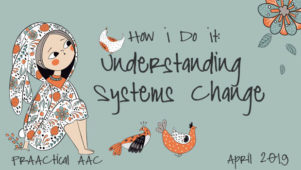
Have you ever dreamed of taking a detour in your AAC work to address the needs from a totally different direction? Special educator Sarah Mueller did just that. Follow along as she tells us about her journey from teacher to student. :::::::::::::::::::::::::::::::::::::::::::::::::::::::::::::::::::::::::::::::::::::::::::::::::: “Autism isn’t something a person has or a ‘shell’ that a person is trapped inside. There’s no normal child hidden behind the autism. Autism is a way of being. It is pervasive; it colors every experience, every sensation, perception, thought, emotion, and encounter, every aspect of existence. It is not possible to separate the autism from the person – and if it were possible, the person you’d have left would not be the same person you started with. This is important, so take a moment to consider it: Autism is a way of being. It is not possible to separate the person from the autism.” – Jim Sinclair... [Read More...]
December 3, 2018
by Carole Zangari -
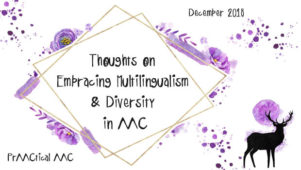
How can we best support learners with complex communication needs who come from a variety of cultural and linguistic backgrounds? Today, we turn the reins over to Arizona-based SLP Deanna Wagner who shares her thoughts on embracing and encouraging multilingualism and diversity in our AAC work. ::::::::::::::::::::::::::::::::::::::::::::::::::::::::::::::::::::::::::::::::::::::::::::::::::::::::::::::::::::::::::::::::::::::::::::::: My latest article on cultural diversity has just been published in the ASHA Special Issue on Cultural and Linguistic Diversity and AAC, guest edited by Gloria Soto! That means that ASHA members who have a Special Interest Group affiliation can access it and receive CEU credit for studying the content and answering a few questions. Since not all readers are members of an ASHA SIG, I would like to take a moment to share my experiences in preparing the manuscript that I submitted for this article. Most importantly, as people who serve the needs of those who benefit from AAC, we all need... [Read More...]
November 7, 2018
by Carole Zangari -
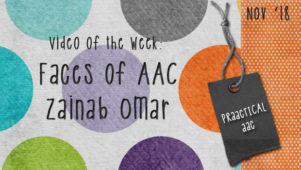
Hearing the AAC stories of people with complex communication needs is always enlightening, but even more so when the narratives are told directly by those individuals. In today’s featured video, we hear from South African teenager Zainab Omar. Enjoy! Many thanks to Zainab for sharing her story and to ISAAC for making this available to all of us. Please consider supporting this wonderful international organization (here’s how). Communication is everyone’s birthright. Direct Link to Video – https://www.youtube.com/watch?v=TrAe7oc-Rjo
August 18, 2016
by Carole Zangari -
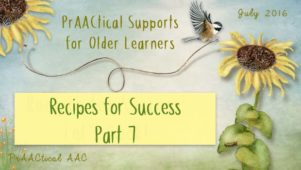
Welcome back to the PrAACtical Supports series, highlighting the work of the AT team at the Children’s Hospital of Richmond at VCU (CHoR). Meghan Reitz, an SLP who has worked at CHoR for over 3 years, returns to share activity ideas for older learners and downloadable handouts for their caregivers. She received her Master’s in SLP from the University of Virginia., which provides comprehensive services for pediatric healthcare. The CHoR AT Program is one of few comprehensive AT programs in Central Virginia, providing AT evaluations, equipment and training to people of all ages, enabling children and adults with disabilities to function more independently. CHoR’s AT team consists of 4 SLPs, 2 OTs, a PT, and a Therapy Practice Assistant. In addition to completing transdiciplinary evaluations and treatments, CHoR’s AT team is responsible for supporting staff and sharing AT information to five CHoR therapy centers throughout Central Virginia. Meghan has a passion for working... [Read More...]
August 11, 2016
by Carole Zangari -
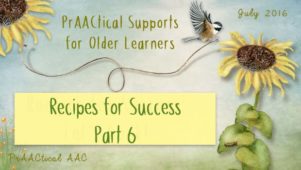
Welcome back to the PrAACtical Supports series, highlighting the work of the AT team at the Children’s Hospital of Richmond at VCU (CHoR). Meghan Reitz, an SLP who has worked at CHoR for over 3 years, returns to share activity ideas for older learners and downloadable handouts for their caregivers. She received her Master’s in SLP from the University of Virginia., which provides comprehensive services for pediatric healthcare. The CHoR AT Program is one of few comprehensive AT programs in Central Virginia, providing AT evaluations, equipment and training to people of all ages, enabling children and adults with disabilities to function more independently. CHoR’s AT team consists of 4 SLPs, 2 OTs, a PT, and a Therapy Practice Assistant. In addition to completing transdiciplinary evaluations and treatments, CHoR’s AT team is responsible for supporting staff and sharing AT information to five CHoR therapy centers throughout Central Virginia. Meghan has a passion for working... [Read More...]
August 4, 2016
by Carole Zangari -
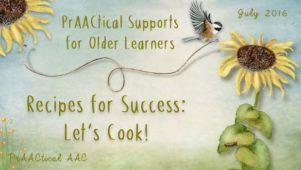
Thanks to all of you who reached out with appreciation for the ideas and resources shared in last month’s PrAACtical Supports posts (you can see those here). We’re delighted to continue the series and grateful to the AT team at the Children’s Hospital of Richmond at VCU (CHoR), which provides comprehensive services for pediatric healthcare. The CHoR AT Program is one of few comprehensive AT programs in Central Virginia, providing AT evaluations, equipment and training to people of all ages, enabling children and adults with disabilities to function more independently. CHoR’s AT team consists of 4 SLPs, 2 OTs, a PT, and a Therapy Practice Assistant. In addition to completing transdiciplinary evaluations and treatments, CHoR’s AT team is responsible for supporting staff and sharing AT information to five CHoR therapy centers throughout Central Virginia. Today’s guest blogger is team member Meghan Reitz, an SLP who has worked at CHoR for the past... [Read More...]
September 16, 2015
by Carole Zangari -
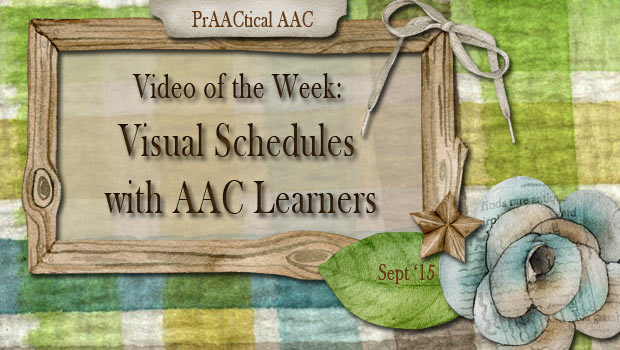
While our therapy sessions are highly individualized to meet the needs of specific individuals, there are a couple of strategies that are effective with almost every learner on our caseloads. Topping that list is the use of visual schedules. Whether it is a written agenda, a picture schedule for the session, a mini schedule for the parts of an activity, or an object schedule for the day’s events, this is one of the few strategies that has something to offer every learner. We’ve written before about this topic. In this post, you can find links to many of the topics we’ve addressed about making and using them. Today, we’ll look at a few videos on the use of this strategy. To get us started, here’s a video of Ann Syrstad sharing information about using this evidence-based intervention for individuals with ASD. Next, we head to Malaysia, where the Early Autism... [Read More...]
August 4, 2015
by Carole Zangari -
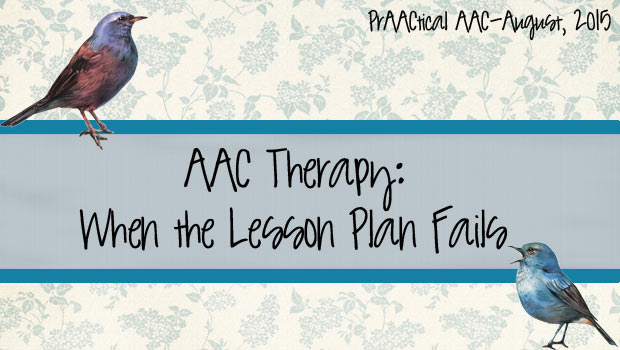
We’ve all been there. You have meaningful goals, engaging materials, and a solid lesson plan for our therapy session. Five minutes into the session, it’s clear that the AAC learner has little or no interest in what we’ve prepared. Now what? Our choices are limited: persevere with the plan, modify it somewhat, or scrap it entirely. What’s a clinician to do? Take A Breath The first thing to do is breathe. Know that you are not the first one to struggle to engage this learner, and you won’t be the last. Think of it not as an excuse for an unproductive session but as a problem-solving challenge. Previous clinicians may have justified the session’s difficulties and atttibuted them to the learner’s lack of engagement, limited attention span, or behavioral problems. Personally, I feel sad for those clinicians because when we take that approach, not only do we fail the client,... [Read More...]









